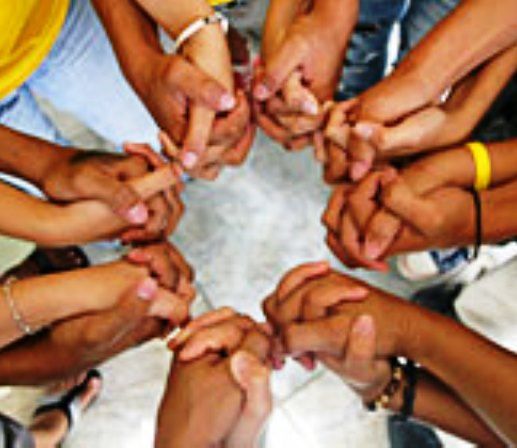Don’t Miss the Role of Relationships in Ministry
During the start of our replant at Central, my husband was doing double duty as both the youth pastor and the senior pastor. And while he was working hard and doing both jobs well, there were definitely times where he simply couldn’t be everywhere at once. One of those weeks was our yearly Vacation Bible School. He needed to be with the kids and their families at VBS, but also needed to be able to lead the youth VBS. A volunteer saw there was a need and stepped in to lead the youth, and a man who felt called to preach offered to give the messages each night.
This man was a new Christian and a recent member of the church. He had enthusiasm for preaching and for giving his testimony. He was willing to call out and confront sin. He was bold in his approach to teenagers and felt strongly about the necessity of preaching about Heaven and Hell. Unfortunately, he lacked one thing– he had zero relationship with those students. They didn’t know him or trust him, and he hadn’t listened to their stories enough to know them. They listened to his preaching, but he couldn’t meaningfully connect to them on a personal level.
While he had a passion for preaching, he had failed to recognize the three key ingredients for ministry: Ministry is about relationships, relationships, and relationships.
Without Relationships, There is No Ministry

I have often heard the joke, “Ministry would be a lot easier if it wasn’t for all the people.” And it’s true– replanting a dying church might be easier without confronting sin, changing minds, or having difficult conversations about long-standing traditions.
But without the people, what have you replanted? A church without people is just a beautiful, empty building.
In Episode 199, Jimbo and Bob discussed the danger of missing people while doing ministry. When we start seeing people as the problem and not the solution to the problem, we miss the most important factor of our ministry. Relationships are the guiding factor of every ministry of the church.
Evangelism Must be Relational Evangelism
When we think of evangelism, we may initially think of the revival evangelist or the old gospel tracts that used to be given out in door to door evangelism. (I was once given a gospel tract under the stall in a gas station restroom– true story).
While those methods have their places, we have found that far more often, the unchurched world responds better to relational evangelism. In a study by LifeWay, 79% of unchurched people said they don’t mind a friend who really values their faith talking about it with them.
As pastors, there are going to be people who you cannot reach. They may be uncomfortable talking to a pastor, especially if they have experienced church hurt in the past. Many people still believe they have to act differently in front of a pastor or clean themselves up to have a conversation.
Fortunately, there are people in your congregation who have relationships with those people already. They are their co-workers, family, and friends. They have greater opportunity to share the gospel with those in their circle of influence than you ever will.
But if you haven’t cultivated relationships with those in your church, they will never feel comfortable bringing their unchurched family and friends into your presence.
Cultivating relationships means we must be willing to listen to the people to whom we minister. Active listening is a crucial piece of relational evangelism. Hearing someone’s story gives you insight into why they act the way they act and into how they think about the world around them. Johnny Rumbough, DOM/AMS of the Lexington Baptist Association in South Carolina, asks three questions when he begins working with a church. First, tell me your Jesus story– how did you come to know Christ? Next, tell me your church story– how did you come to this church? And third, does anyone else know these stories? Those three questions give incredible insight into the people he is leading– where they are spiritually and emotionally.
Unfortunately, many of us fail to employ active listening skills. James 1:19 tells us to be quick to hear and slow to speak, but many times we are too caught up in telling our own stories, arguing our points, or simply waiting to move to the next thing on our agenda. We rush to speak, leaving others feeling unheard and unloved.
Evangelism is about relationships. You have to know people to reach people.
Discipleship is Relational Discipleship

As a replant pastor, one of your main goals is likely starting a new discipleship program or revamping an existing one. In doing so, you may want to start addressing sinful behavior and stubborn attitudes immediately. But without relationships, you run the risk of resenting people and seeing them as the enemy instead of loving them and leading them well, and as Mark Clifton has said, you can’t reach what you resent.
Loving people is central to our calling not only as pastors, but as followers of Jesus. When asked what the greatest commandment is, Jesus answered that it was loving God first, then the second is like it- loving people! We cannot escape the command to love others.
Yes, loving someone can mean telling them the truth about their sin– but that truth must be surrounded by care for the person’s well-being. We must recognize that without relationships with people, we have very little “buy-in” to speak truth into their lives.
When we are creating discipleship pathways and programs, we have to remember that people are at the center of it. Real, flawed, broken people– and we are real, flawed, broken people leading them! Our own selfish ambitions can push us to move too fast, go too far, or simply forget that people need to feel loved.
Relational Discipleship takes time and effort. Sure, it would be far easier to just hand someone a list of behaviors and tell them to change. But we aren’t called to simply tolerate people or to force change on them. We are in the unique and wonderful position of encouraging people toward spiritual growth and development! It’s a greater blessing to see your congregation as friends and family who are growing in their faith!
Community is a central human need. Hebrews 10 reminds us that we as believers need to encourage each other, all the more as the day of the Lord draws near. Paul reminds us in Colossians 3 that we must forgive each other, and bear with each other, but above all “put on love, which binds everything together in perfect harmony.” Loving people brings unity. Do you have a divided church? Build relationships with those on both sides of an issue and encourage them to find ways to show love to the other side– you’ll be surprised at how quickly division turns to unity.
Ministry is Relational Ministry

Without relational ministry, you have no ministry. It’s that simple, and it’s that difficult. Before you begin planning new programs, processes, and pathways, you must build relationships. You cannot skip this step. You have to make the Lord your number one and people your number two. And all of your systems, programs, and processes have to serve those two things.
There used to be a saying that people don’t care how much you know until they know how much you care. I think that’s because God designed us that way. When we feel cared for, loved, and safe, we are able to express our fears, desires, and needs more readily.
This is especially true if you are trying to meet the needs of the community around you– particularly if your church has been resentful or hurtful to the community around it in the past. Before you offer to help someone, they need to know you care about them.
Let me give an example: There is a house beside your church with knee-high weeds and grass. It’s obvious they aren’t going to cut it, and it’s an eyesore. So one Saturday, you grab a group of volunteers and head over to cut the grass. They call the police and accuse you of trespassing and the relationship with that family becomes a hostile and angry one.
Now, imagine if you went over, introduced yourself, and got to know the family. You realize that it is a single mom with young children who is working two jobs to make ends meet. Her lawnmower broke a few months ago, and she hasn’t had the money to replace it and even if she could, she doesn’t have time to cut the grass. Her children are too young to help, and she’s doing all she can. She confides that she would love a yard her children could play in and feel safe in. You ask if it would be alright if you had some people come over and clean up the yard, making it a safe space for kids to play. She knows you care and want to help, so she is excited to have the church’s involvement in her life.
In both scenarios, you’ve done ministry in your community. But in one, you’ve built a connection and cultivated trust. In another, you’ve damaged the relationship, possibly irrevocably.
People Need You, and You Need People
When you forget that your primary ministry is building relationships with your community and congregation, you will run people over in the name of progress. You will become a bulldozer instead of a builder.
Ministry requires relationships with people. To go back to the old joke, yes, ministry is easier without people– but that’s because without people, ministry fails to exist!


 The pressure of ministry can sometimes feel insurmountable. In the
The pressure of ministry can sometimes feel insurmountable. In the 
 If our church hurt comes from a verbal exchange, it’s best to go to that church member and say, “My brother, I’m not sure you realized that when you said _________, I felt like you were saying ___________. This was hurtful to me.” I wonder how many times we would see the grace of reconciled relationships, if we simply tamed our tongues and went directly to the source of the conflict.
If our church hurt comes from a verbal exchange, it’s best to go to that church member and say, “My brother, I’m not sure you realized that when you said _________, I felt like you were saying ___________. This was hurtful to me.” I wonder how many times we would see the grace of reconciled relationships, if we simply tamed our tongues and went directly to the source of the conflict. 